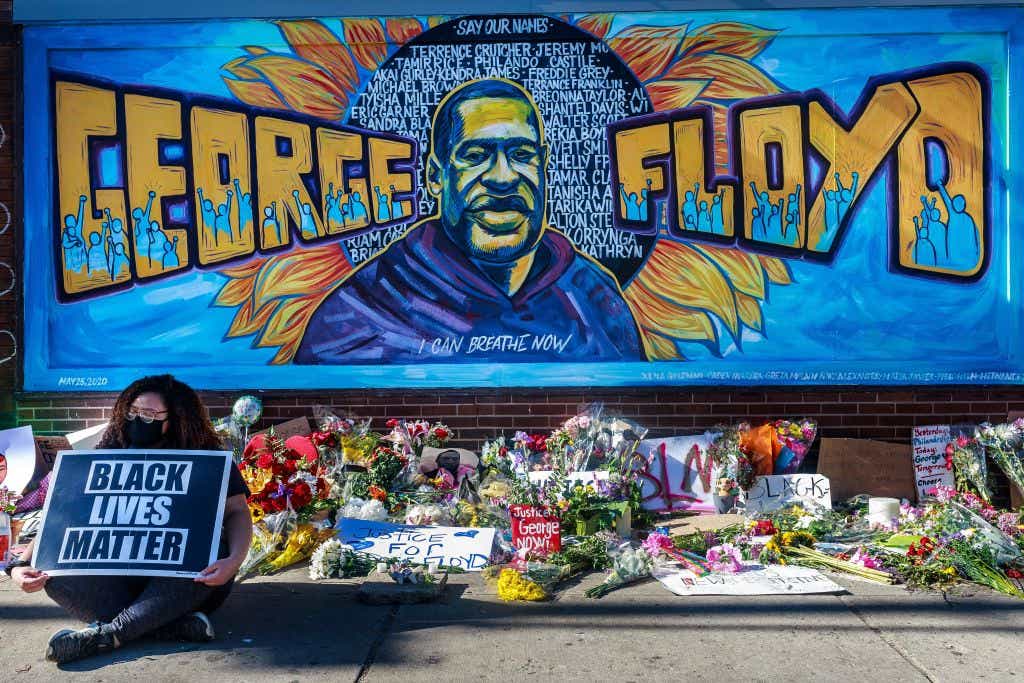It has been two years since George Floyd’s killing at the hands of Minneapolis police sparked racial justice demonstrations across the U.S., and yet it seems like little has changed in terms of policing reform and efforts to address systematic racism.
Though President Biden recently signed an executive order to reform federal policing, the government has failed to enact any meaningful improvements after the George Floyd Justice in Policing Act died in the Senate, and racially-motivated attacks are on the rise. Even with these troubling developments, the George Floyd Foundation believes some progress has been made on the road to racial justice.
“There's been gradual change and although many people are wanting a swift overnight shift, that just won't happen right now,” says Jacari Harris, the executive director at the George Floyd Memorial Foundation. “So we are thankful for the small wins and we're just looking for other major milestones when it comes to policing, gun control, and Black lives.”
But Harris emphasizes advocates still have a ways to go when it comes to obtaining legal justice for the Black Americans killed by police, and Floyd’s case is no exception. While ex-Minneapolis police officer Derek Chauvin is now serving a 22½-year murder sentence, one of the other officers involved in Floyd’s death has just been sentenced to only three years in prison, and two more officers who were on the scene won’t stand trial until this June.
“The truth is going to come out and the truth is that these officers did wrong,” Harris tells KCM.
Pushing for change
Despite these hurdles, the George Floyd Foundation has vowed to continue to push for the legislation bearing Floyd’s name, which calls for banning police chokeholds and ensuring the use of body cameras on officers, among other reforms. Even if the full bill doesn’t pass Congress, Harris is optimistic that at least parts of it will ultimately succeed with some more conversations and inevitable compromises.
“We are hopeful that it will eventually pass,” he says. “What I know is we all have more in common than what would separate us.”
His comments come ahead of Biden’s policing order that would direct all federal agencies to revise their use-of-force policies, create a national registry of officers who have been let go for misconduct, and offer anti-bias training. While it doesn’t go nearly as far as Floyd’s bill, The New York Times reports that it will at least get some support among activists and police alike because it offers at least a substantive step towards addressing issues around law enforcement.
But the George Floyd Foundation isn't waiting on lawmakers to make change. According to a report it released on Wednesday, the nonprofit has granted $65,000 in scholarships and donated $32,000 directly to Black communities since it was first launched in 2020. It has also helped organize more than 500,000 hours of community service, and invested $300,000 in programming on initiatives like leadership development.
Still, these pushes for change don't come without challenges. Even though Harris points out there are more conversations around policing and race, violence toward Black Americans has only gotten worse. Recently released FBI data showed that Black Americans made up more than half of the 8,052 reported hate crime victims in 2020, with rates increasing from 1,972 to 2,871 over the course of a year.
The most recent example is the attack at a Buffalo supermarket last week that left 10 dead and three others wounded. In response, Harris said the foundation is doing all it can to offer support for the community, including donating funds, food, and counseling services. Ultimately, he hopes the attack, which is now being investigated as a hate crime, won’t get swept under the rug.
“This shouldn't just be a call just for gun control, but it should also be a call to face and end white supremacy,” he tells KCM.
Addressing the current crisis
The racist attack did so much more than steal lives and one of the neighborhood’s only grocery stores. Harris points out that this kind of news and subsequent violent images also open up longstanding wounds of Black trauma that go back generations.
“These constant images have a severe impact on the mental health of Black Americans, and studies show that Black Americans receive the least amount of support, the least amount of resources, and the least amount of mental health therapy services,” he tells us. According to the National Alliance on Mental Illness, only one in three Black adults actually get the mental health care they need.
To help address this mental health disparity, the George Floyd Foundation has created a new mental health program to educate the Black community on the importance of getting therapy and the counseling they need. This includes putting money toward mental health organizations and even individual families to help reduce barriers to treatment.
“We can't change the past, but we sure can work toward a better future for all and that's what we're doing,” he tells us.









